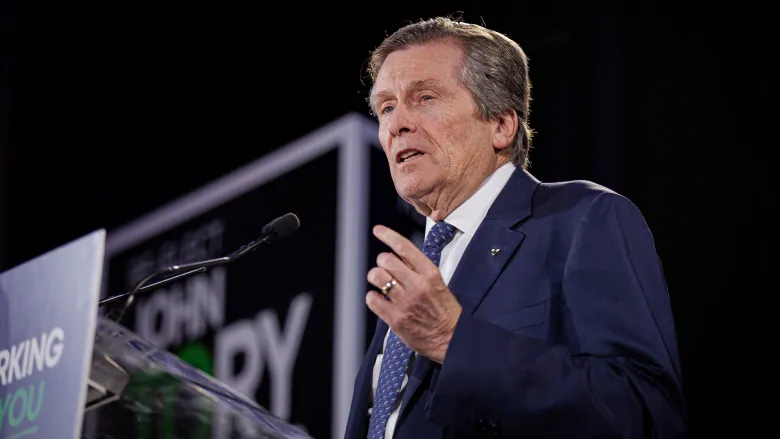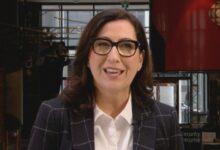‘Hugely hopeful about the future of this city’: John Tory wins 3rd term as Toronto mayor
John Tory cruised to a third term as Toronto’s mayor Monday as Canada’s biggest city faces down an intractable housing crisis and more than $1-billion budget shortfall.
Tory, 68, beat out 30 other largely unknown candidates to hold on to the mayor’s chair at city hall. With a majority of polls reporting, he looked set to win at least 62 per cent of the votes, in the ballpark of the 63.5 per cent he secured in 2018.
“I am deeply grateful for the faith and the trust that you’ve put in me to once again lead our city for the next four years,” Tory said during a speech to supporters in a room at the Fairmont Royal York hotel downtown.
He thanked his campaign team and all the candidates who put their names on a ballot in this election, and added that he believes he was handed a strong mandate from voters.
“I am hugely hopeful about the future of this city,” Tory said. “We have unfinished business that I am absolutely determined to see through.”
The longtime politician and former executive at Rogers Communications ran a typical frontrunner’s campaign that featured few major commitments and saw him participate in only two debates with a select group of his challengers.
His win comes as he’s faced criticism about the state of Toronto under his leadership.
Opponents noted the high cost of housing, aging infrastructure, overflowing garbage bins and shuttered parks. Tory’s main challenger, progressive urbanist Gil Penalosa, had said he was motivated to run after talking with residents who felt the city was “falling apart.”
Penalosa looked on track to pick up about 18 per cent of the vote share. He said he hopes Tory works to make Toronto a city for everyone.
“I talked to the young people who said it’s good, but for the boomers. I talk to the boomers and they say it is good for the young people. I talk to the people in the downtown and they say it is good for the suburbs. In the suburbs they say it’s good for the downtown. Everyone thinks it is good, but for someone else,” he told supporters in a backroom at a pub in Koreatown.
City facing budget challenge
The new city council term will see Tory have the option to wield so-called “strong mayor” powers granted to the leaders of Toronto and Ottawa by Ontario’s Progressive Conservative government this year.
Tory has repeatedly stressed that he prefers to build consensus with councillors and intends to use the new powers sparingly. While Ontario has no political parties at the municipal level, in his eight years at the helm Tory has built a majority bloc of mostly centrist and centre-right leaning allies at city hall, rarely losing a vote during his last term.
He spent significant time campaigning with some members of that coalition facing close races, such as Mark Grimes, who ultimately lost in Etobicoke–Lakeshore to progressive Amber Morley. He also looked to expand his influence, supporting and endorsing candidates in open wards previously held by progressive councillors, though his preferred candidates in wards 4, 9 and 18 all failed to win seats.
Tory rose to power in the city of nearly 2.8-million people following the tumultuous, and at-times chaotic, tenure of the late former mayor Rob Ford. His political brand is built upon his reputation as a manager that puts a premium on stability and incremental change.
Few of his headline commitments from his 2014 run to lead Toronto have come to fruition over two terms, though he has fulfilled a key promise to keep property tax increases at or below the rate of inflation — a policy he has said he will continue (although inflation is far higher now than it was when he previously made that promise.)
His centrepiece promise from his 2014 campaign, a 53-kilometre rail line connecting Markham and Mississauga with downtown Toronto that he dubbed SmartTrack, was hypothetically supposed to be finished this year. While the SmartTrack plan never materialized, Tory did help engineer an alternative $28-billion transit plan for Toronto that has secured funding from both the provincial and federal governments.
His commitment to fiscal austerity came under fire from some of his challengers during the campaign. Coming out of the COVID-19 pandemic and the immense revenue losses that came with it, Tory and council will need to navigate a $1-billion budget hole in the coming year.
In his remarks Monday, Tory said that the city will need to find efficiencies in its budget and operating costs. That reality comes as the cost of living continues to rise across the country.
“Whether it be the city government or your own household, we will have to face significant economic and financial challenges in the coming months,” he said.
“With my experienced leadership and committed council colleagues … we can get through this period of uncertainty and come out stronger on the other side, because that is what people expect us to do.”
Toronto is also facing a housing crisis that is driving many residents, particularly young families, from the city. In the last term, Tory supported legalizing multi-tenant housing, sometimes called rooming houses, citywide — a bid that ultimately failed to gain enough support among councillors for Tory to force a vote. It marked his biggest policy defeat during his time as mayor.
As part of his campaign, Tory pitched a five-point housing plan that could reform zoning bylaws to allow for more duplexes and triplexes, particularly on arterial roads served by the TTC, and streamline the development process.









Redes Sociais - Comentários